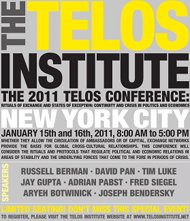This paper was presented at the 2011 Telos Conference, “Rituals of Exchange and States of Exception: Continuity and Crisis in Politics and Economics.”
 Slavoj Žižek poses more than a few heavy-gauge questions in his In Defense of Lost Causes. Foremost among them, at the beginning of chapter nine: “The only true question today is: do we endorse this ‘naturalization’ of capitalism, or does contemporary global capitalism contain antagonisms which are sufficiently strong to prevent its infinite reproduction?” (421). This vast question—as well as its possible answers—develops in many ways out of the discussion in the previous chapter of the book, in which Žižek approaches Alain Badiou’s concepts of subtraction and the Event with his usual copious verve, as well as with substantial concern that Badiou’s “subtraction” means that one might have the capacity to stand “outside” the “state form,” but only in a way that is “not destructive of the state form” (402). Žižek thus concludes that Badiou has
Slavoj Žižek poses more than a few heavy-gauge questions in his In Defense of Lost Causes. Foremost among them, at the beginning of chapter nine: “The only true question today is: do we endorse this ‘naturalization’ of capitalism, or does contemporary global capitalism contain antagonisms which are sufficiently strong to prevent its infinite reproduction?” (421). This vast question—as well as its possible answers—develops in many ways out of the discussion in the previous chapter of the book, in which Žižek approaches Alain Badiou’s concepts of subtraction and the Event with his usual copious verve, as well as with substantial concern that Badiou’s “subtraction” means that one might have the capacity to stand “outside” the “state form,” but only in a way that is “not destructive of the state form” (402). Žižek thus concludes that Badiou has


